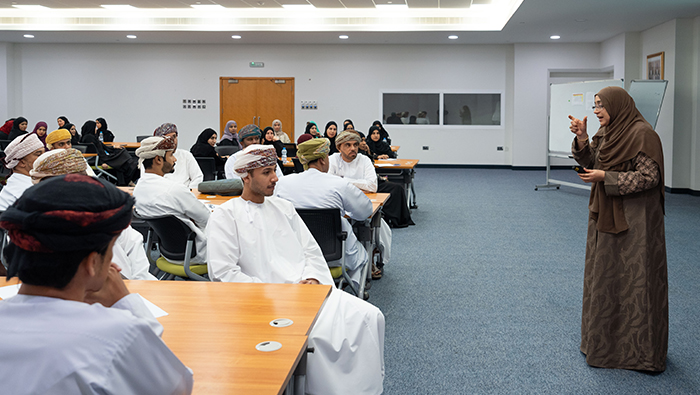The Ministry of Education in Muscat recently launched a training program titled ‘Performance Management According to the Proficiency System for Measuring Individual Performance’. This initiative, conducted by the Directorate-General of Administrative Affairs, aims to enhance the performance of 60 employees by introducing them to the OKRs methodology and strategies for measuring individual performance. The program covers various aspects of performance management, including the formulation of goals, selection of indicators, annual evaluation processes, feedback mechanisms, and methods for addressing low performance.
The training program is being conducted over a period of two days at Muscat Hall in the Ministry’s General Diwan. It is being led by trainers from the Office of the Individual Performance System and the Specialised Institute for Professional Training of Teachers. The program includes sessions on performance measurement, the OKRs methodology, sources of the basic employee plan, types of indicators, annual evaluation processes, feedback mechanisms, and strategies for addressing low performance. Participants will also learn about tools such as the Ejada kit and visual displays for evaluating the role of the direct official and the employee.
One of the key objectives of the program is to improve the formulation of goals and main results in the individual plan. Participants will also learn how to enhance the selection of weights, indicators, and logical targets for measuring goals and main results. Additionally, the program aims to help individuals identify the roles of the direct official and calculate the result of the actual performance evaluation at the end of each evaluation cycle. By equipping employees with these skills and tools, the Ministry of Education hopes to enhance overall performance and productivity within the Directorate-General of Administrative and Financial Affairs.
Throughout the program, participants will be introduced to various concepts and methodologies related to performance management. This includes understanding the elements and classifications of the employee plan, standards for formulating goals and main results, and steps for approving evaluation results. The program also focuses on providing practical steps for choosing indicators, defining feedback mechanisms, and developing strategies for addressing and improving performance. By implementing these strategies, employees will be better equipped to set realistic goals, track progress towards these goals, and address any performance issues that may arise.
The training program also emphasizes the importance of regular feedback and continuous improvement. Participants will learn about the stages of feedback delivery, strategies for providing effective feedback, and the conditions that should be considered when selecting indicators. Additionally, the program will cover techniques for analyzing low performance using radical analysis methods, proposing solutions for improving performance, and utilizing tools such as the Ejada kit for evaluation purposes. By incorporating feedback mechanisms and performance analysis tools, employees will be able to identify areas for growth and development, ultimately leading to enhanced performance and productivity.
In conclusion, the ‘Performance Management According to the Proficiency System for Measuring Individual Performance’ training program initiated by the Ministry of Education in Muscat aims to enhance the performance of employees within the Directorate-General of Administrative and Financial Affairs. Through sessions on performance measurement, goal formulation, indicator selection, feedback mechanisms, and performance improvement strategies, participants will acquire the skills and tools needed to enhance overall productivity and performance. By focusing on continuous improvement, regular feedback, and effective performance management techniques, this program seeks to equip employees with the knowledge and resources necessary to thrive in their roles and contribute to the success of the ministry.


























